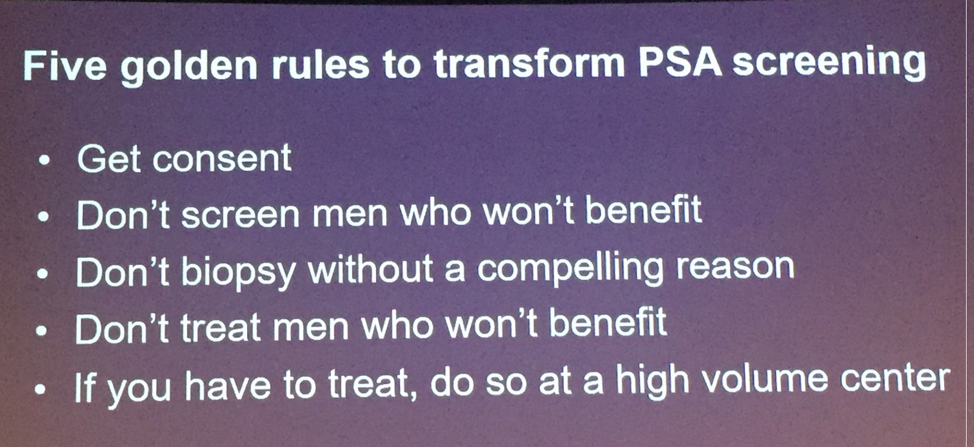He showed data that evaluated PSA screening trends over time, stratified by patient age, and made the argument that we are screening older patients, particularly those over the age of 70, far too frequently. With the overutilization of screening comes overtreatment and harm to some patients, particularly in those with low-risk disease.
Dr. Vickers advocates for a harm-reduction approach to prostate cancer screening. He listed five “golden rules” that he believes can help transform current screening practices. These include taking time to have shared-decision making with each patient and obtaining informed consent so that a man knows the potential risks and benefits of undergoing screening. Next, he feels that we should not be screening men who are unlikely to benefit from screening. These include older or unhealthy patients with limited life expectancies. Furthermore, he notes that in men who are screened, we need to be judicious in determining who requires a biopsy based on this information. Next, he feels that we should not be treating men who are unlikely to benefit from intervention. These again include older and less healthy patients, as well as those who have low-risk disease. Finally, he believes that patients who do receive treatment should do so at high-volume centers in order to minimize side-effects of treatment and to ensure the best possible cancer-specific outcomes.

Dr. Vickers then went on to discuss the utility of reflex biomarker tests such as the 4Kscore to better risk-stratify men to ensure that we are appropriately treating those patients who are at higher risk of disease progression, metastasis, or death from prostate cancer. He believes that when used appropriately, genetic testing can help reduce overdiagnosis and overtreatment of men with prostate cancer by up to 50%. He also feels that the utilization of multiparametric MRI can also be useful in helping to reduce the risk of overtreatment in some men, particularly those with low-risk disease.
Based on his interpretation of the data, he concluded that we should not be screening men over the age of 70 for prostate cancer and that we should not be screening most men over the age of 60, particularly if their PSA at age 60 is <1.5. Finally, he strongly advocates for the use of active surveillance in all men with Gleason 6 disease. He believes that there should be a trend towards the decreased use of prostate cancer screening, particularly in the older population.
Presented by: Andrew Vickers, Ph.D., Attending Research Methodologist, Memorial Sloan Kettering Cancer Center
Written by: Brian Kadow, MD, Society of Urologic Oncology Fellow, Fox Chase Cancer Center at the 2019 American Society of Clinical Oncology Genitourinary Cancers Symposium, (ASCO GU) #GU19, February 14-16, 2019 - San Francisco, CA


